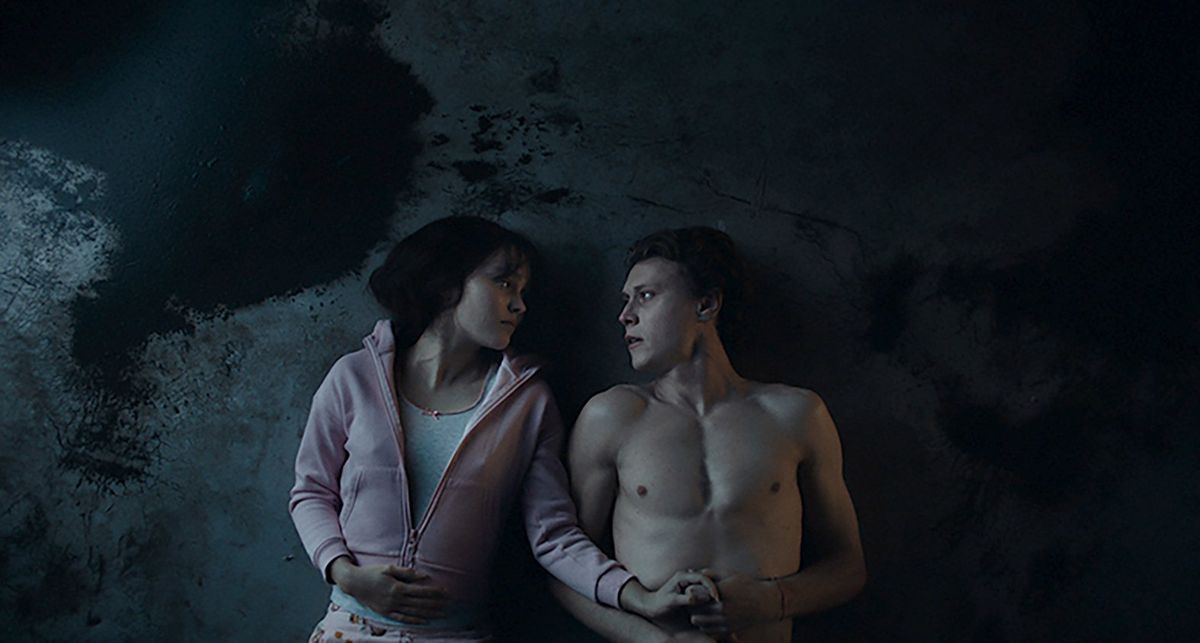Review: ‘Wolf,’ about a guy who thinks he’s a wild animal, is as mixed up as its hero

IMDb describes the film “Wolf,” which centers on a young man (George MacKay) who thinks he’s a wolf, as a “high-concept art-house drama.” How high? Put it this way: Maybe it shouldn’t be driving. Set in a clinic of sorts – whose therapeutic mission seems to fall in the gray area between rehab and conversion therapy – the perplexing sophomore feature from Dublin-based Italian writer-director Nathalie Biancheri (“Nocturnal”) concerns a made-up malady called Species Identity Disorder.
In the fantasyland of Biancheri’s imagination, SID is a common-enough condition to afflict several children, teenagers and young adults, each of whom is struggling with the belief that he or she is a parrot (Lola Petticrew), a horse (Elsa Fionuir), a squirrel (Darragh Shannon), a duck (Senan Jennings) or a panda (Karise Yansen), among other animals. “I’m Rufus,” says one lad (Fionn O’Shea), introducing himself at a group therapy session of the sort you might find at a gathering of people with bulimia or addictions to alcohol or drugs or the like.
“I’m a boy. I used to believe I was a German shepherd. And my favorite food is corned beef.” MacKay’s Jacob is the newest patient, dropped off by his parents in an early goodbye scene of mixed emotions that might remind some of “Boy Erased,” the 2018 drama based on Garrard Conley’s memoir of the same name, about his experience as a victim of what’s known as the gay “reparative therapy” movement. Jacob seems ashamed of himself at first and desirous of change. He wants – or appears to want – to be “normal,” more than he wants to be himself, i.e., a doglike carnivore who howls at the moon.
Being oneself is (or, again, seems to be) the theme of “Wolf,” which at times plays like a clumsy allegory about, say, the challenges faced by trans youth – there’s a poster on the wall of the clinic about “species dysphoria” – yet most of the time is simply a more generalized fable about finding your groove, your bliss, your true, inner self – and running with it (naked, if need be, and on all fours). If it’s an allegory, it trivializes whatever it’s allegorizing.
MacKay is a fine actor, vividly rendering Jacob’s anguish at being a wolf trapped in a human body. Terry Notary is credited as the actors’ movement coach, and he himself plays a man who thinks he’s a lion, and who has been imprisoned at the clinic for years. Notary is a prolific actor and talented movement consultant known for portraying several nonhuman roles onscreen, often via motion capture, including King Kong, Groot, a goblin in the “Hobbit” movies and the chimpanzee Rocket in “Dawn of the Planet of the Apes.” His contribution to “Wolf” is a significant one.
It should be noted that Jacob doesn’t seem to have much difficulty accepting that body he has when he meets and eventually canoodles with a pretty young thing named Cecile (Lily-Rose Depp), who more commonly goes by the name of Wildcat. Whether Wildcat actually thinks she a wildcat or is merely a “wild” girl is up for discussion. When Jacob asks her whether she’s staff – because she seems to have access to locked rooms – or a patient, she equivocates: “Not exactly” is her answer to both questions.
And never mind the biological implications of a wolf mating with a wildcat, or sharing a cafeteria table with what, in the animal kingdom, would be his prey. However “Wolf” is intended to be taken, it’s not especially nuanced. Paddy Considine plays the clinic director with the unsubtle name Dr. Mann, aka the Zookeeper, in a caricature of abuse that includes leashes, cages and making the boy who thinks he’s a squirrel try to scurry up the side of an impossibly fat tree to prove it.
There’s a good message in “Wolf” about not losing connection to our natural selves, but it’s delivered with a jerk on the choke chain: “Technology connects us to our human side,” one character observes, without irony, explaining why patients are encouraged to use mobile devices and video games. In the end, Jacob must chose between answering the call of the wild – running off like Mowgli – or heeding the tug on his heartstrings. The first option just seems bizarre, outside a fairy tale; the other, cliche.